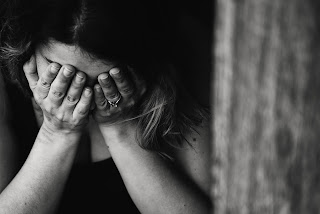Mental illness or other personality disorders are usually notable factors in criminal behavior, delinquency, suicide, alcoholism, narcotic addiction, and often in cases of divorce.
Mental illness and other personality disturbances occur at all ages. In some cases, psychosis (a mental disorder characterized by a disconnection from reality) happens before the age of 15.
Photo by Kat Jayne from Pexels
The various psychoses have preferred age ranges for their initial development. They don't all affect the same age brackets to the same extent. Schizophrenia is a frequent psychosis of youth and early adult life. This disorder begins between 15 and 30. Few people develop it after 50.
The most common psychoses of the middle age group between 35 and 60 are manic depressive, general paresis, alcoholic psychosis, paranoia, and involutional melancholia. The first three develop most frequently between the ages of 40 and 50.
The last two are most common in their initial incidence between the ages 50 and 55. The psychoses of old age are senile psychosis and cerebral arteriosclerosis. The great majority of cases develop after 60.
Emotional Disturbances
Most people have minor emotional disturbances that are not recognized but have medical significance because of their effects on general health.
Many people in the industry, labor, and public life get along although they suffer at all times with difficulties of adjustment to their environment.
Most of them have complaints due to emotional disorders, which are reflected as physical disorders. Frustration, anxiety, and fear may appear as headaches, ulcers of the stomach, asthma, or similar conditions.
Treatment is not fully satisfied unless it takes care of the mental as well as the physical factors.
Mental Depression
Depression is a state of emotional dejection and sadness, usually accompanied by decreased activity. Depression in a person is reflected in his attitudes toward other people and their actions.
Depression is a state of mind in which action and decisions are paralyzed. When people are depressed, they grow too careful. They are afraid of spending money or having pleasures and entertainments. Eventually, the person becomes on bad terms not only with the world in general but also with himself.
They tend to live in the past and evade the future. Their depression will son reflects itself in personal appearance. They also become irritable, so they are rude and hypercritical. For this reason, people who are depressed tend to resemble one another in several ways.
Overcoming Depression
One of the most important steps in overcoming depression is to understand their condition. This at least will serve to prevent constant worry and anxiety.
People who insist that they never worry have learned to reason themselves, by rationalization, out of anxiety over situations in which they find themselves.
Other people develop mental tranquility or peace of mind by accepting some belief which eliminates from consideration anything that is displeasing.
This is not rationalization but may bring identical effects for a person who is capable of shutting out from his thoughts any problem that disturbs them.
Peace of mind is necessary for accomplishment because the absence of peace of mind gives a constant feeling of insecurity. Often mental depression is transferred to physical symptoms, such as extra heartbeats, constipation, or diarrhea.
Photo by cottonbro from Pexels
Importance of Mental and Emotional Health
Emotional and mental health is important because it’s an essential part of our life. It influences your thoughts, behaviors, and emotions. Having a healthy emotion can increase productivity and effectiveness in your daily activities like work or school. It also allows you to adapt to changes in your life and cope with difficulties.
You can do few simple steps to improve your mental health every day. Small things like exercising, eating healthy meals, opening up to other people in your life, taking a good night sleep, remembering something you are grateful for, can help boost your emotional health.
However, if you start to see changes in your overall happiness and relationships, and you feel like you can't do it on your own, there are always ways to get the support you need.
Do not be afraid to talk to a professional. If you start to feel like your emotional health is starting to impact you, it may be time to reach out for extra support. You can see a psychologist or psychiatrist and find the personalized support you want.








Comments